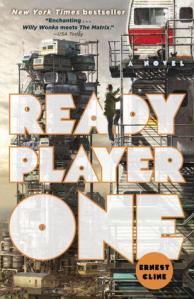 Blurb: It’s the year 2044, and the real world is an ugly place.
Blurb: It’s the year 2044, and the real world is an ugly place.
Like most of humanity, Wade Watts escapes his grim surroundings by spending his waking hours jacked into the OASIS, a sprawling virtual utopia that lets you be anything you want to be, a place where you can live and play and fall in love on any of ten thousand planets.
And like most of humanity, Wade dreams of being the one to discover the ultimate lottery ticket that lies concealed within this virtual world. For somewhere inside this giant networked playground, OASIS creator James Halliday has hidden a series of fiendish puzzles that will yield massive fortune–and remarkable power–to whoever can unlock them.
For years, millions have struggled fruitlessly to attain this prize, knowing only that Halliday’s riddles are based in the pop culture he loved–that of the late twentieth century. And for years, millions have found in this quest another means of escape, retreating into happy, obsessive study of Halliday’s icons. Like many of his contemporaries, Wade is as comfortable debating the finer points of John Hughes’s oeuvre, playing Pac-Man, or reciting Devo lyrics as he is scrounging power to run his OASIS rig.
And then Wade stumbles upon the first puzzle.
Suddenly the whole world is watching, and thousands of competitors join the hunt–among them certain powerful players who are willing to commit very real murder to beat Wade to this prize. Now the only way for Wade to survive and preserve everything he knows is to win. But to do so, he may have to leave behind his oh-so-perfect virtual existence and face up to life–and love–in the real world he’s always been so desperate to escape.
A world at stake.
A quest for the ultimate prize.
Are you ready?
Review: Have I mentioned how much I loathe bloated action scenes? I loathe bloated action scenes. What fun am I supposed to find in reading about characters attacking each other? Unfortunately, the last quarter of Ready Player One descends into a massive battle where the wholeheartedly good draws virtual weapons against the unabashedly evil, which led my eyes to skimskimskim since: I loathe bloated action scenes.
Casting aside this disappointing ending, however, I found Ready Player One to be fantastically entertaining. It’s not high literature, but on a popcorn level—where once you take a bite, you can’t stop—it’s excellent. It’s about a young guy living in a dystopic future where everyone lives inside a virtual video game reality. This young guy faces off with a Big Bad Corporation that is trying to take control of the video game by winning a scavenger hunt contest created by the game’s deceased creator. Winning the contest requires an encylopediac mind crammed with 80s pop culture trivia, early video games lore, and famed fantasy and science fiction knowledge.
Now my familiarity with the 80s is limited. Beyond playing Duck Hunter and listening to Tainted Love on a loop, that decade does not exist for me, mostly because I did not exist. I would have loved a 90s version of this with challenges based on Beanie Babies, Tamagotchis, Pokemon cards, the Backstreet Boys, The Lion King, and Gameboy Colors, but alas…(though, whoa, I need to write that book pronto before I succumb to ND—Nineties Deprivation.) I was worried about not enjoying this due to my lack of 80s knowledge, but it’s absolutely secondary. Some of the references triggered no neural impulse, yet I still understood what was going on.
The main problem is that Ernest Cline is obviously a debut novelist. His prose is constructed almost entirely with simple sentences. A subject verbs something; then the subject verbs something else; next the subject verbs a new something else, etc. His characters are flat too. Wade, the protagonist, has no flaws and miraculously succeeds at everything he tries to do. The choice of Wade as the main character is disappointing actually. Another main character in the scavenger hunt, Art3mis, is a geek girl and would have been a more interesting protagonist than your typical pimply white male hacker geek extraordinaire.
There is also no depth. There is a chapter near the middle of the book where I could tell the author suddenly tried to add some deeper themes for pondering, but it failed since it was the opposite of effortless. Yet strangely, I didn’t want to be challenged in my reading. I was enchanted enough by the creativity of the virtual reality world designed and by the scavenger hunt challenges themselves. The challenges are the best part; in a nice parallel fashion, the book is a virtual reality for us readers, a bit of personal escapism where we can put ourselves in the characters’ places and try to solve the puzzles. So when Cline made a clumsy attempt at profundity, all I wanted was for him to return to the game so that I could get back in the zone.
When you’re looking for a few hours of fun, definitely read this. I can almost guarantee you’ll enjoy it in the basest pleasure center of your brain. For now, excuse me, I need to hunt down an original Nintendo set and watch every John Hughes movie ever.